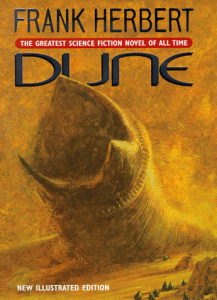 There is an interesting item that appeared in Tablet: A New Read on Jewish Life titled “What Science Fiction Tried To Teach Us About Jihad, and Why No One Listened.” The subtitle explains a little further: “How Alejandro Jodorowsky muddled sci-fi by turning Frank Herbert’s ‘Dune’ into a New Age manifesto.”
There is an interesting item that appeared in Tablet: A New Read on Jewish Life titled “What Science Fiction Tried To Teach Us About Jihad, and Why No One Listened.” The subtitle explains a little further: “How Alejandro Jodorowsky muddled sci-fi by turning Frank Herbert’s ‘Dune’ into a New Age manifesto.”
In the piece by Liel Liebovitz introduces the subject matter with reference to a documentary film. In his view Herbert’s novel was turned into something far less powerful in terms of social commentary than it could have been. He writes:
The storyboard and its illustrious creator are the stars of a new documentary, Jodorowsky’s Dune. Its thesis is simple and convincing: By taking a stab at filming the sprawling 1965 desert-based novel by Frank Herbert, Jodorowsky had assembled in 1974 a team of inspired artists who had given contemporary sci-fi its visual language, from the light sabers of the Jedi to the face-huggers of Alien, and helped propel the genre to the peak of pop culture cool.
It’s all true—but it pales next to Jodorowsky’s even grander and more questionable achievement, which was to move Dune—and, with it, much of the sci-fi genre—away from the thorny questions of ideology and social conflict and toward a softer, more luminescent set of concerns, like identity and self-empowerment, that now reign supreme. To adopt for a moment the director’s colorful, inflamed language, Jodorowsky was the prophet of the flight from the real. Instead of Herbert’s geopolitical toughness, he gave us rainbows and unicorns of self-revelation. And the rest of us are paying the price.
Later in the essay Liebovtiz describes how Jodorowsky changed Herbert’s Dune into something more in keeping with the spirit of the age of the 1960s than the original vision of the author:
It’s a testament to Jodorowsky’s uncanny ability to so perfectly capture the spirit of the age that his Dune intuited that with the political predilections of the 1960s leaning heavily toward the throbbing questions of identity, science fiction could serve as an intellectual and spiritual Petri dish in which to allow radical ideas to grow. Jungian theories of collective consciousness, Freudian notions of personal psychology, jitters about authority, and an approach to technology that embraces its potential as a tool of salvation while simultaneously recognizing its power to corrode all that is human—these would be the themes of the new art. The novels and stories of writers like Philip K. Dick, the advent of the Internet, and the rise of the cyberpunk movement placed Jodorowsky’s themes at the crux of popular culture, giving us one complex meditation on the nature of the self after another. Some of these meditations are intriguing and inspired. Many others are inane. But none have anything to do with the world of Frank Herbert.
Read Liebovitz’s piece here. And learn more about Jodorowsky’s Dune documentary here. The trailer is below.





There are no responses yet